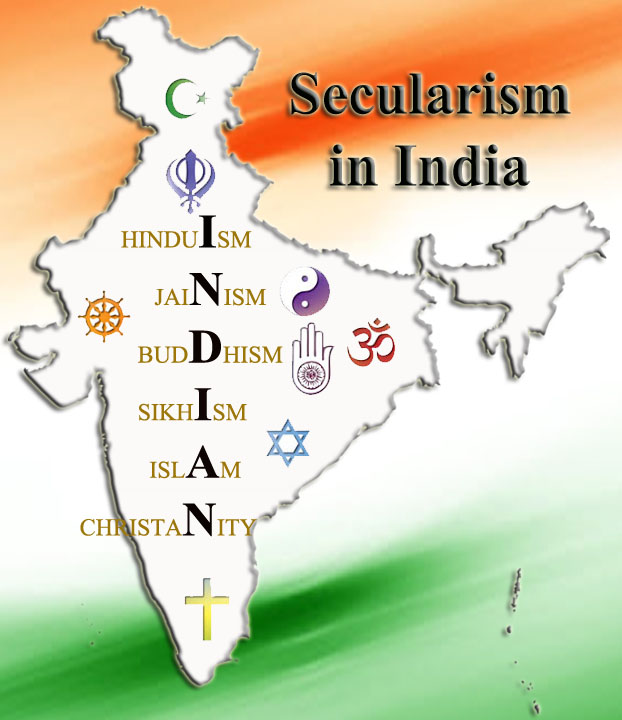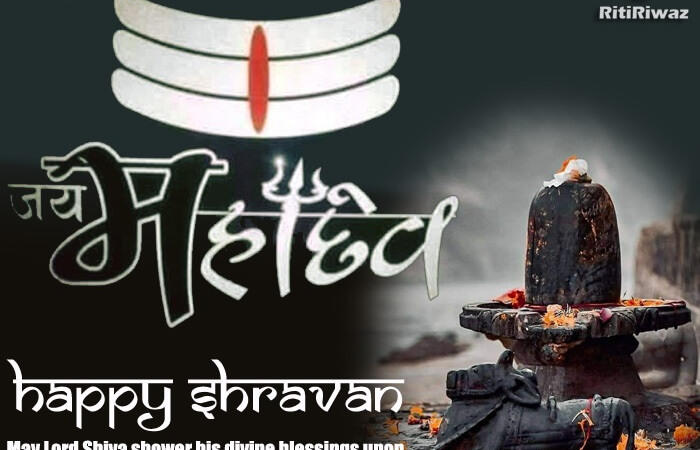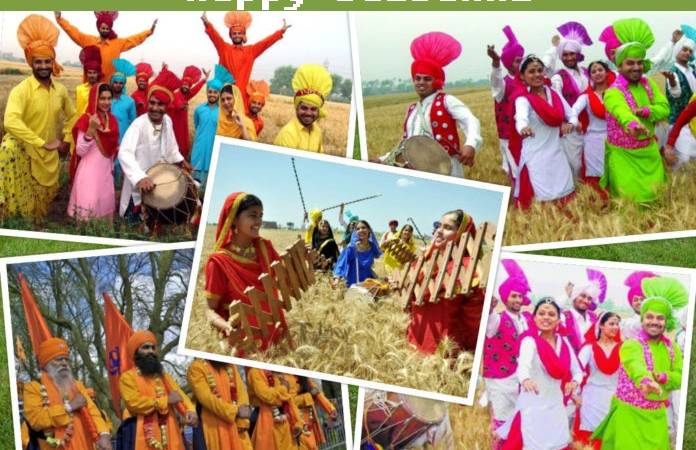Secularism In India

India is a secular country where the people of different religions, cultures, castes, sects, and creeds live in harmony with one another. There is no official religion of the country it recognizes all religions equally, people of India are free to practice any religion of their choice.
The Preamble to the Constitution stated clearly that India is a secular nation and its citizens have freedom of faith, worship, and religion. The constitution confers common citizenship on all its people and each citizen can enjoy all rights and privileges, irrespective of religion or caste, it does not assign a special position to any particular religion.
Indian nationalism claimed to represent everybody in the country irrespective of caste or creed, Nationalism was taken to be synonymous with secularism. One could easily witness Temples, Mosques, Gurudwaras, and Churches in any part of the country and all religions are treated equally in the eyes of law.
The concept of ‘secular’ in fact was first used in Europe where the church had complete control over all types of properties and nobody could use the property without the consent of the church. Some intellectuals raised their voice against this practice. These people came to be known as ‘secular’ which meant “separate from the church” or “against the church”.
Secularism in India is based on Sarva Dharma Sama Bhava means equality of the destination of the path’s followed by all religions. The Sarva dharma sama bhav concept is one of the keys of secularism in India, and is translated as “All religions are the same” or “All paths lead to the same destination“.
Secularism forms the three fundamental rights in the constitution which are the Right to Equality, the Right to freedom of religion, and cultural and educational rights. India is the melting pot of various religions and races some were born on the land while others were because of successive invasions.
Among the main religion in India are Hinduism, Islam, Christianity, Sikhism, Buddhism, Jainism and Zoroastrianism. Hinduism is the oldest religion in India and is followed by the majority of the population in India. Secularism means that in India, we observe neutrality and impartiality to all religions. We respect all religions and their beliefs and method of worship.
Also Read: Religion in India
A Sanskrit phrase Vasudhaiva Kutumbakam is found in Maha Upanishad which means “the world is one family“. Our secularism promotes peace and harmony and India is respected for its age-old values of spreading peace through its philosophy of Vasudhaiva Kutumbakam. In India, all minority religions enjoy full freedom and in certain cases are protected. This is different in neighboring countries like Pakistan and Bangladesh which were once part of India but they later became Islamic countries.
Secularism does not mean that the state is hostile to a particular religion. If a person is a Hindu, he/she does not cease to be secular. According to Articles 25 and 26, no person can do such religious things which affect the public order, morality, and health. However, there are certain events that show all communities have always not lived with peace all over the country.
The Britishers have applied a policy of “Divide and Rule” which led to a confrontation between Hindus and Muslims and resulted in the Partition of India in 1947 as India and Pakistan. The partition has led to Hindu-Muslim riots which resulted in great loss of human life and property. Various other events like the Massacre of Sikhs, the demolition of Babri Masjid, Godhra carnage have revealed the weakness of the secular character of India.
Political parties somewhat play a communal card to their advantage, all politicians should commit themselves to national unity and secularism. Politicians use religion for political goals, the communal-secular card is being played for political motives only. Religion has become a convenient weapon in the hands of unscrupulous politicians. Mobs are ready to commit mayhem on the basis of religious sentiments. Some of the political parties have a vested interest in communism & communal violence to gain power, others tolerate it to retain power.
Communalism today poses a great danger to Indian society and polity and its virus should be weeded out by all means. The fact that India’s unity lies in accepting its rich diversity and should be wholeheartedly realized. We should promote tolerance, social justice, economic welfare, and equality among all the citizens which will help in securing the secular fabric in India.
Long-Term Remedy for Communalism
1. There is a need to initiate the process of de-communalization of the people at all levels, say, by exposing communal assumptions, by exposing communal assumptions, by explaining to them the socio-economic and political roots of communalism, and by letting them know that what the communalists project as problems are not the real problem and what they suggest as remedies are not the real remedies.
2. Communalism of state and of the political elite in power has to be checked because it leads to inaction against communal violence and covert or overt political and ideological support to communalism by the state apparatuses, including the media under state control.
3. Communalization of civil society also needs to be checked because it leads to more communal roots and other forms of communal violence. It is here that intellectuals, political parties, and voluntary organizations can be the most effective.
4. The role of education, particularly value-oriented education, both in schools and colleges is important in preventing communal feelings.
5. The media can prove to be significant in preventing communal feelings. The communal press can be banned and legal action can be taken against communal writers.
6. The ideology that economic development, industrialization, growth of capitalism, and the growth of the working class would automatically weaken and ultimately eliminate communalism should not be overplayed.
Suggested Read: Culture and Tradition of Indian States






